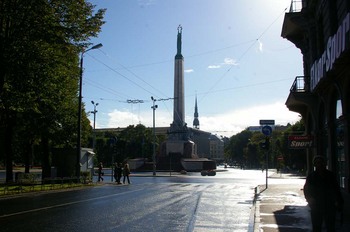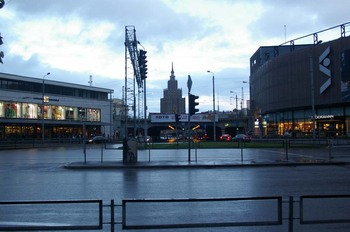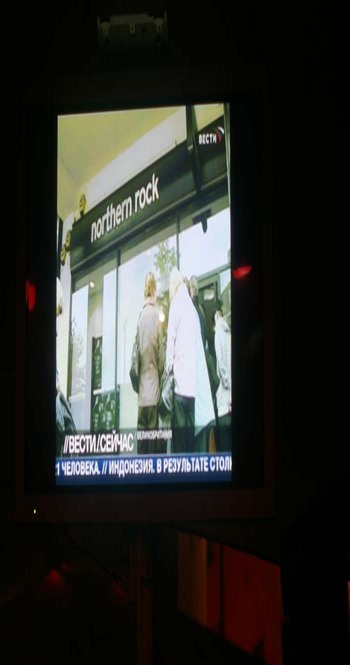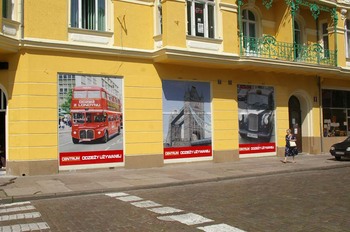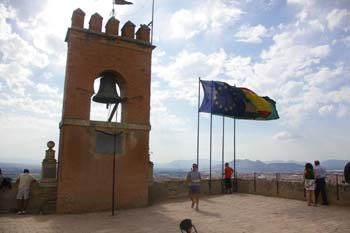I have just sent NO2ID a cheque. Now might be a good time for many people to do the same, whether or not they took the pledge.
|
|||||
|
If you are opening (say) a chain of casual clothing stores in Portugal, and you want to give them an English name that you hope provides an image of stylish people driving fast cars, you might want to check with a number of native English speakers whether the word you choose might not have other meanings or connotations in English. As a minimum, I cannot see Throttleman conquering the world in the way that other clothing labels from cities nearby have been known to, and however good their supply chain management appears to be (Zara of course are masters of this). In between getting depressed about the way things are going back in London, it is worth thinking about things that have improved in the last couple of decades. This city, with its beautiful Art Nouveau architecture (much of it designed by Mikhail Eisenstein, father of Sergei) was part of the Soviet Union a mere 20 years ago, with all the bleakness and tyranny that this implied. Today, it is modern and that is in the past, although still occasionally visible in the distance. I can fly here from London for not much more than £50 return. Rather more importantly, Latvians are free to fly to London for not much more than £50 ($100 US) return, and free to live and work in the UK, and many other places. The beer here is excellent, and the coffee not quite so excellent (a northern European thing in both cases, I think). One can sit outdoors in beer garden in the evening, listening to live music, drinking beer, and watching a TV news channel that the proprietors of the bar have provided for patrons. It is like being in many other places, other than that the languages and channels are different. Even in Germany one often seems to find oneself watching Sky News or CNN in English. Not so much here. Here, despite the similarity of the stories, there is still some sense that there is a bear in the room. On the other hand, watching a Chelsea game with commentary in Russian seems perfectly right, somehow, so I suppose the invasion has gone both ways. (Click for larger versions of the above photographs). Correction: When I first posted this I wrote “Art Deco” when I meant “Art Nouveau”. Also I misspelled Mikhail Eisenstein’s name. Apologies. Must get more sleep. In the next few days Pope Benedict plans to issue his second encyclical – the most authoritative statement a pope can issue – which apparently will focus on social and economic inequity in a globalized economy. In the statement, he is expected to denounce the use of tax havens as socially-unjust and immoral in cheating the greater well-being of society. According to the Times (UK) newspaper, the statement may have been inspired by a recent request to the Vatican by Romano Prodi, the Italian prime minister, who urged church leaders to speak out on tax evasion. – The delightful Corporate Accountability and Workplace website. Quite right, too. What higher moral authority could there possibly be than a Prime Minister of Italy?
– Plato. The Republic. Thanks to Jackie for making me think of this. On Sunday evening, I returned a rental car at Los Angeles International Airport prior to boarding a flight to London. LAX is one of those airports where the car rental station is some distance from the terminals, and having returned your car, you board a shuttle bus that takes you to your terminal. There were only a small number of people on this particular bus, and the driver asked each of us which airline we were travelling on and hence which terminal we needed to be taken to. One of the other passengers was a young woman – perhaps 30 years old. She told the driver that she was flying on United, hesitated and said “…but it is an international flight. Is that the same?”. As is the case with many Americans, she gave the impression that she did not fly internationally very often, so I assured her that she was going to the correct terminal. I asked her where she was going. She answered “Johannesburg”, and told me that she was going via London to get there. I expressed surprise that she had to take such a long route, and she told me that she could have flown to Washington and got a direct flight from there, but that the 15 hours non-stop from Washington to Johannesburg was a longer flight than she wanted to take. Personally, I have done more than a few 15 hour flights in my time, and I would not have made the same choice she did (for me, getting the total journey time down to as small a time is key, but other people’s mileage does vary, somewhat literally in this case). I mentioned that I had friends and family in Johannesburg and that I had visited that city earlier this year, and she asked me what it was like. I told her that the rich parts of northern Johannesburg (where she was going) are like southern California but with more fortifications, which may or may not have reassured her. I asked her why I was going. She said it was “Business”, and that she was “involved in the Live Earth concerts”. I probably should have asked her how she was involved, or what she did, or something, but connections between LA and the music industry are not exactly surprising. I was tempted to make some snide remark about how the Johannesburg concerts had just been relocated to a smaller venue due to lack of interest, but in truth the discovery as to why this woman was travelling rather caused me to lose interest. I suppose the real question might have been just exactly how she thought that flying lots of people like her from LA to London to Johannesburg was going to help global warming exactly, but I could not be bothered asking. And in truth it would have been rude to ask, because I was just making friendly conversation with a perfectly pleasant woman before catching a flight. I fear though, that we are back to “essential” travel for “important” people like politicians, rock stars, and people who work in the music industry somehow not counting. Making sacrifices to save the world is something for the plebs to do. Three weeks ago it was a long weekend in the UK, and on Monday afternoon I therefore somehow found myself wandering fairly aimlessly around the centre of Szczecin in Poland. After contemplating for a little while that one of the major differences between communism in Poland and East Germany was that in Poland churches were rebuilt lovingly, whereas in East Germany they were dynamited for ideological reasons, and just thinking about how many ghosts there are in sites of ferocious battles between the Wehrmacht and the Red army, I found myself staring at these advertisements on a wall. Not speaking Polish myself, I was entirely baffled by what this was saying or why, other than whatever it was having a certain amount of latent Anglophilia in it. Therefore I just took the photo and walked on. Last night, while having a few beers in a pleasant London bar with a fellow Samizdatista, I took the opportunity of asking a Polish waitress what it meant. She looked at it for a moment, paused, and said “That is very weird…… They sell vintage clothing….weird”, poured my beer into my glass, and walked off. In truth that only enhanced the mystery. Further questions arise. What exactly does it say on the front of the bus? Do the proprieters of this business use mod fashion to express the essense of London’s street fraternity culture? I need to know Perhaps the readership can help?. On Saturday, I took this photograph of the Torre de la Vala. This tower is part of the ramparts of the Alcazaba, the (largely destroyed) citadel of the Alhambra, the palace and fortress of the former Moorish kings of Granada in Spain. At this exact place, the banners of King Ferdinand and Queen Isabella were flown on January 2, 1492, upon the surrender of King Muhammad XII of Granada (known to the Spanish as Boabdil). This marked the capture of Granada and the final expulsion of the Moors from Spain. It all seems rather violent and provocative to me though. If perhaps the reconquistadors had negotiated and found a peaceful settlement rather than forcibly erecting their banners, then the so called “Tragedy of Andalucia” might not have occurred, and the world might be a better place with fewer grievances today. Rather than releasing occasional rants to Al-Jazeera from a cave somewhere near the Afghanistan/Pakistan border, Osama bin Laden might be a well adjusted and peaceful man running a flat pack furniture business from an office park in Abu Dhabi, and the World Trade Center in New York City might yet be standing. Or perhaps not. In the early 1980s, American telecommunications company AT&T commissioned management consultancy McKinsey to conduct some research into the newly invented mobile phone. How large was the market for these new devices likely to be? In a report that now makes hilariously funny reading, McKinsey predicted that there would be a world market for about 900,000 of these devices*. This led to AT&T initially not investing in the new technology. In 1994 they entered the business by buying the mobile phone business created by Craig McCaw, and after an assortment of forwards, reverse, and sideways takeovers this business lives on as AT&T Mobility today. It is possible to compare this number with the actual size of the world market for mobile phones – there are now around three billion active mobile phones in the world. That is straight and to the point. However, other kinds of comparison perhaps better illustrate just how wrong the prediction was. For instance the number of phones that McKinsey predicted would make up the world market is almost exactly the same number of phones that Britons accidentally dropped in the toilet in 2006 (* For the sake of honesty, I do have to point out that McKinsey actually did make that prediction of 900,000 as the size of the market “for the year 2000”. Yes, they did pretty much choose a year randomly and they were predicting 900,000 on a “that’s pretty much everyone who will want one” basis, but it must none the less be mentioned. In any event, there were about half a billion mobile phones in the world by 2000, so they were still out by a touch) |
|||||

All content on this website (including text, photographs, audio files, and any other original works), unless otherwise noted, is licensed under a Creative Commons License. |
|||||
